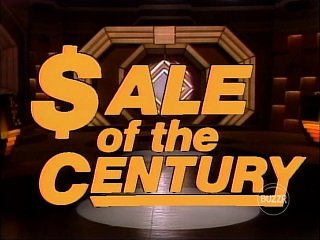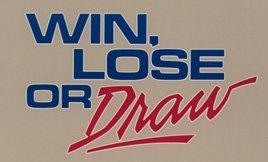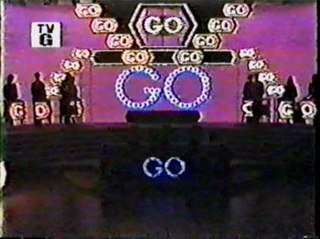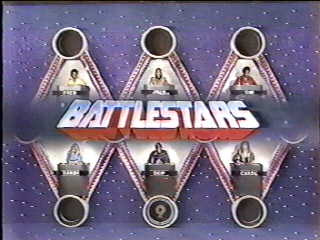
Hollywood Squares is an American game show in which two contestants compete in a game of tic-tac-toe to win cash and prizes. The show piloted on NBC in 1965 and the regular series debuted in 1966 on the same network. The board for the game is a 3 × 3 vertical stack of open-faced cubes, each occupied by a celebrity seated at a desk and facing the contestants. The stars are asked questions by the host and the contestants judge the truth of their answers to gain squares in the right pattern to win the game.

Match Game is an American television panel game show that premiered on NBC in 1962 and has been revived several times over the course of the last six decades. The game features contestants trying to match answers given by celebrity panelists to fill-in-the-blank questions. Beginning with the CBS run of the 1970s, the questions are often formed as humorous double entendres.

Card Sharks is an American television game show. It was created by Chester Feldman for Mark Goodson-Bill Todman Productions. The game features two contestants who attempt to predict the outcome of survey questions to gain control of a row of oversized playing cards, then determine whether the next card drawn is higher or lower. The title Card Sharks is a play on the term "card sharp", a person skilled at card games.

Sale of the Century is an American television game show that originally debuted on September 29, 1969, on NBC daytime. It was one of three NBC game shows to premiere on that date, the other two being the short-lived game shows Letters to Laugh-In and Name Droppers. The series aired until July 13, 1973, and a weekly syndicated series began that fall and ran for one season.

Win, Lose or Draw is an American television game show that aired from 1987 to 1990 in syndication and on NBC. It was taped at CBS Television City, often in Studios 31, 33, and 43 at various times. It was co-produced by Burt & Bert Productions and Kline & Friends for Disney's Buena Vista Television. It has also had two versions on The Disney Channel: Teen Win, Lose or Draw from 1989 to 1992, and a revived version known as Disney's Win, Lose or Draw which aired in 2014. New York described Win, Lose or Draw as "a knockoff" of the board game Pictionary, however, Burt Reynolds and Ed McMahon referred to playing the game at Burt's home during the August 2, 1978 episode of The Tonight Show, with Johnny Carson, three years before Pictionary was created.

Figure It Out is an American children's panel game show that aired on Nickelodeon. The original series, hosted by Summer Sanders, ran for four seasons from July 7, 1997, to December 12, 1999. The show was revived in 2012, with Jeff Sutphen as host, with the revival airing from June 11, 2012, to July 16, 2013. The series was originally recorded at Nickelodeon Studios at Universal Studios in Orlando, Florida. The revival episodes were filmed on stage 19 at Paramount Studios in Los Angeles.

Jackpot is an American and Canadian television game show produced by Bob Stewart which saw contestants attempting to solve riddles in order to win cash and prizes.

Go is an American television game show created by Bob Stewart and aired on NBC from October 3, 1983, to January 20, 1984. The show featured two teams, each composed of four contestants and a celebrity. The teams had to construct questions one word at a time to convey a word or phrase to their teammates. The concept of Go was based on "Instant Reaction", an endgame played on two different iterations of another game show created by Bob Stewart, Chain Reaction, in 1980 on NBC and from 2006–07 on GSN.
Time Machine is an American game show where contestants compete to answer trivia questions about popular culture and recent history to win prizes. The show aired on NBC from January 7 through April 26, 1985, and was hosted by John Davidson. Charlie Tuna was the announcer, with Rich Jeffries as his substitute. Reg Grundy Productions produced the series, and upon its premiere Time Machine was one of three Grundy series airing on NBC.

Dream House is an American game show that saw contestants competing to win, as the title of the show indicates, a new house. The show originally premiered in primetime on ABC on March 27, 1968, with a daytime edition premiering on April 1, 1968. The primetime series aired weekly until September 19, 1968, and the daytime series aired daily until January 2, 1970, when it was replaced with All My Children. The daytime series was revived for NBC's daytime schedule and premiered on April 4, 1983, running until June 29, 1984.

Battlestars is an American game show that aired on NBC during the 1980s. The program's concept was developed and produced by Merrill Heatter, featuring a six-celebrity panel. The object of the game is to "capture" the celebrities by lighting up numbers positioned around triangle shapes, inside of which sat each panelist. Similar to Hollywood Squares, which Heatter also co-created and produced, the celebrities are asked questions by the host, and the contestants judge the truth of their answers in order to light up the numbers.

Caesars Challenge is an American game show that aired on NBC from June 14, 1993, to January 14, 1994, and was recorded at the Circus Maximus Theatre of Caesars Palace in Las Vegas, Nevada. Ahmad Rashad hosted the series and, in keeping with the theme of the show's location, he was assisted by a man dressed as a Roman gladiator. Dan Doherty played the role for most of the show's run, with Chad Brown and Zach Ruby handling the earliest episodes before Doherty joined the show.

Mindreaders is an American game show produced by Goodson-Todman Productions which aired on NBC from August 13, 1979, through January 11, 1980. Although NBC originally agreed to a 26-week run, the network canceled Mindreaders after 22 weeks. The host was Dick Martin and the announcer was Johnny Olson, with Jack Narz subbing. The program was taped at Studio 4 at NBC in Burbank, California.

Miljoenenjacht, officially Postcode Loterij Miljoenenjacht, is a Dutch game show, sponsored by the country's postcode lottery, where a contestant and at-home viewer could win up to €5,000,000 or as little as €0.01. The show is broadcast at various times, spanning across six episodes for each set. The program was originally shown by TROS on NPO 2, but moved to creator John de Mol's channel Tien in 2005. After the channel was discontinued after its sale to the RTL Group, the program moved to RTL 4. In 2019, the program moved to SBS6 due to the transfer of Linda de Mol from RTL to SBS.

Showoffs is an American television game show which ran on ABC from June 30 to December 26, 1975. Bobby Van was host, with Gene Wood as announcer. The Mark Goodson-Bill Todman production involved two teams competing in a game of charades.

Missing Links is a Goodson-Todman game show hosted by Ed McMahon which originally ran on NBC from September 9, 1963 to March 27, 1964, then moved to ABC for its final nine months, with Dick Clark replacing McMahon as host.
Make the Connection is an American game show, sponsored by Borden, that ran on Thursday nights from July 7 to September 29, 1955, on NBC. Originally hosted by Jim McKay, he was replaced after the first four episodes by Gene Rayburn, who debuted as a game show host on August 4, 1955.

Three for the Money is an American game show produced by Stefan Hatos-Monty Hall Productions that aired on NBC from September 29 to November 28, 1975. Dick Enberg was the host with Jack Clark announcing. Enberg was also hosting Sports Challenge at the time and had just joined NBC's sports division.
Love Me, Love Me Not is a Canadian game show based on the Italian game show, M'ama non m'ama, which in English means "love me, love me not". Both shows were created by Steve Carlin, the producer of The $64,000 Question in the 1950s. In 1988 there was a British version of the show, with the same name.

It's Anybody's Guess is an American game show broadcast on NBC from June 13 to September 30, 1977. Monty Hall hosted the show while Jay Stewart was the announcer. Produced by Stefan Hatos-Monty Hall Productions, it was Hall's first time hosting a show other than Let's Make a Deal since 1962, when he hosted Video Village.

















